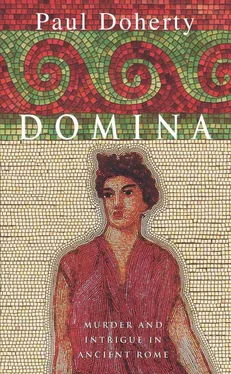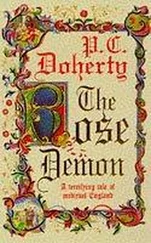Paul Doherty - Domina
Здесь есть возможность читать онлайн «Paul Doherty - Domina» весь текст электронной книги совершенно бесплатно (целиком полную версию без сокращений). В некоторых случаях можно слушать аудио, скачать через торрент в формате fb2 и присутствует краткое содержание. Год выпуска: 2012, ISBN: 2012, Издательство: Headline, Жанр: Исторический детектив, на английском языке. Описание произведения, (предисловие) а так же отзывы посетителей доступны на портале библиотеки ЛибКат.
- Название:Domina
- Автор:
- Издательство:Headline
- Жанр:
- Год:2012
- ISBN:9780755350490
- Рейтинг книги:3 / 5. Голосов: 1
-
Избранное:Добавить в избранное
- Отзывы:
-
Ваша оценка:
- 60
- 1
- 2
- 3
- 4
- 5
Domina: краткое содержание, описание и аннотация
Предлагаем к чтению аннотацию, описание, краткое содержание или предисловие (зависит от того, что написал сам автор книги «Domina»). Если вы не нашли необходимую информацию о книге — напишите в комментариях, мы постараемся отыскать её.
Domina — читать онлайн бесплатно полную книгу (весь текст) целиком
Ниже представлен текст книги, разбитый по страницам. Система сохранения места последней прочитанной страницы, позволяет с удобством читать онлайн бесплатно книгу «Domina», без необходимости каждый раз заново искать на чём Вы остановились. Поставьте закладку, и сможете в любой момент перейти на страницу, на которой закончили чтение.
Интервал:
Закладка:
‘You said the poisoned mushrooms would be enough.’ She glared, totally ignoring her husband’s groans and retching on the bed.
Xenephon, trembling with fright, spread his hands. ‘Excellency, he must have taken antidotes, otherwise what was on the tip of that feather alone would have been enough to kill him outright.’
Agrippina glanced at me. ‘Look, Parmenon. This is like the death of Tiberius all over again.’ She pointed to the bed. ‘If Claudius recovers, we will all die.’
She began to organise the palace guards, and no one was allowed into the chamber. For the next two days Agrippina allowed false messages to be disseminated, stating that the Emperor was recovering from a stomach ailment and all would be well. Seneca and Burrus were brought into the plot. A hand-picked cohort of the Praetorian Guard took up residence in the courtyard. Agrippina never left her husband’s side and for two whole days that old body, rotten with gluttony and excess, tried to fight the effects of the poison. Sometimes Claudius would attempt to rise but the cramps kept him prostrate. Agrippina scrupulously banished all food and drink from the chamber so as to dispel any suspicions that the Emperor was being poisoned. Instead she just waited for the full effects of that first poisonous meal to wreak its effect.
The Emperor, his body wracked by vomiting, retching and violent diarrhoea, gradually weakened. He lost all sense of feeling, muttered about the cold and, on the morning of the second day, finally slipped into death.
Xenophon checked the corpse scrupulously, whilst Britannicus and Octavia were brought to an antechamber and kept there under close guard. Seneca and Nero were summoned to prepare the speech the heir would give to both the Praetorian Guard and the Senate. By mid-morning Agrippina was ready, and the palace doors were thrown open. Nero, with Seneca on one side and Burrus on the other, emerged onto the steps of the courtyard whilst Agrippina’s claque amongst the waiting crowd began the whisper, ‘Claudius is dead! Claudius is dead!’
The Praetorian Guard was also prepared: standards were lifted in salute, trumpets brayed, swords beat against shields and the roar of the soldiers drowned the whispers of the crowd, ‘Long live Nero! Emperor and Caesar!’
My first intimation that Agrippina was not fully in charge of the plot, emerged during Claudius’s funeral. A gilded tabernacle, shaped as a small replica of the temple of Jupiter, was set up in the Forum, containing a bed carved out of ivory and covered with cloth of purple and gold. The dead Claudius lay inside, propped up at the head of the bed, his eyes closed, his face heavily made up as an exhibition to the crowd that the Emperor had not died violently but from some ‘sickness of the stomach’.
Nero stood by the tabernacle and delivered the funeral speech. When he reached the part describing Claudius as, ‘Moderate in his desires, master of all passions, neglecting his personal happiness for the greatness of Rome’, the muffled laughter of the crowd was widespread. Claudius was known as glutton, an old reprobate. Through Seneca’s sarcasm, Nero was openly ridiculing his predecessor. A similar speech was delivered to the Senate and, within a few days, Seneca’s satire appeared on the streets, ‘The Metamorphisis of the Pumpkin’, a sly, vicious attack on the attempts to deify Claudius.
‘Listen to this!’ I said to Agrippina as I read Seneca’s pamphlet. ‘“The Emperor’s soul went out of his body with a clap of thunder from his favourite organ, and he cried: ‘Oh Heavens, I think I’ve messed myself’”.’
‘Claudius deserves to be mocked,’ Agrippina replied. ‘He was a glutton, a man of excess.’
‘That’s not the point,’ I retorted. ‘If Nero is encouraged to mock the office he now holds, he mocks you as well.’
‘My son doesn’t mean to do that,’ Agrippina replied, eyes shining. ‘Have you heard the password that was given to the troops?’ She clapped her hands. ‘“Best of mothers”!’
She wouldn’t hear any more. I disagreed, but the damage was done. Seneca had not only taught Nero Rhetoric, but had also instilled in him a mocking attitude to authority and to all that had gone before: although Agrippina couldn’t see it, that included the ‘best of mothers’.
Oh, Agrippina was accorded every honour. She continued to listen to the Senate debates, sitting on a chair behind the veil. When she processed round the city, Praetorian Guards protected her palanquin; the title of ‘Augusta’ was used more and more; her image appeared on statues and coins. She had an apartment in the palace and Nero visited her every day. Under such fawning love Agrippina blossomed, and the years seemed to slip away from her. She believed she had nothing to fear: Burrus was in charge of the Praetorian Guard; Seneca was now First Minister; Pallas was in charge of the Treasury. The Senate had been purged of any enemies whilst the crowd and the army not only hailed her as mother of their young, handsome, charming Emperor but as the daughter of the great Germanicus. Ah well, politics are like the seasons: the changes are imperceptible until you suddenly realise that you have passed from the mellowness of Autumn to the chill of Winter.
Narcissus returned to Rome a broken man but still a very wealthy one. Agrippina ignored him, but Seneca, for old times sake, dined and wined him; he also encouraged that old wily fox to have one last throw before the game was over. Narcissus kept in the background, claiming ill health, and to all appearances he looked a broken man. Narcissus responded to Nero’s solicitude by agreeing to pay for the games held in honour of Nero’s accession.
I remember that day well. It was a beautiful spring morning and all of Rome was on holiday. Nero and his mother processed down to the amphitheatre near the Forum with all the panoply of power. Beautiful young slaves dressed as satyrs or fauns surrounded their gold-tasselled litter. Senators walked behind in brilliant white togas. Crack cohorts of the Praetorian Guard, in full dress armour, went before. Agrippina, of course, shared the Emperor’s litter, and I walked beside them, holding a curtain back as Nero saluted the crowd with a miniature statue of the goddess Victory carved out of pure gold and studded with precious gems. Nero regarded it as a good luck charm and took it everywhere. He was also sporting an emerald eye-glass and, every so often, would scrutinise the crowd through this before raising a languid hand to acknowledge their salutations. Agrippina wore a wreath of gold and carried a silver staff surmounted by a golden eagle with wings outstretched. She was hailed as ‘Empress’ and ‘Augusta’. She reminded me of a bride on her wedding day. The streets were strewn with flowers; canopies, stretching from one upper storey to another, showered down rose petals, and carpets and tapestries hung from the windows. At every crossroads white-garbed acolytes from the temples burnt perfumed incense in golden pots.
At the amphitheatre, guarded by lines of Praetorian Guards, Nero escorted his mother through the main entrance and up into the imperial box. The mob was already waiting, clad in their browns and greens, munching melon seeds and shouting at the water-bearers for stoups of refreshment. The day was warm and the awnings had been pulled across. To protect the mob a huge fence had been erected around the arena, on which elephant tusks were hung at intervals from which thick nets draped. The mob took this as a sign that not only would wild beasts be part of the spectacle but the games would be bloody and dangerous. The sand in the amphitheatre had been ground from a special stone, and in the sunlight it shone like golden snow. The imperial box smelt of the most fragrant perfume through which the breeze wafted the smell of stale sweat, onions, raw wine and that strange, eerie odour of imminent bloodshed.
Читать дальшеИнтервал:
Закладка:
Похожие книги на «Domina»
Представляем Вашему вниманию похожие книги на «Domina» списком для выбора. Мы отобрали схожую по названию и смыслу литературу в надежде предоставить читателям больше вариантов отыскать новые, интересные, ещё непрочитанные произведения.
Обсуждение, отзывы о книге «Domina» и просто собственные мнения читателей. Оставьте ваши комментарии, напишите, что Вы думаете о произведении, его смысле или главных героях. Укажите что конкретно понравилось, а что нет, и почему Вы так считаете.












